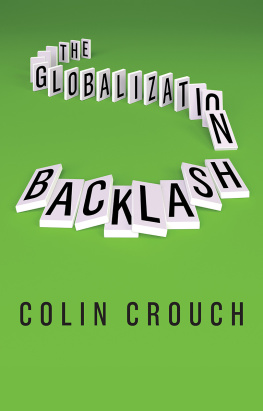Colin Crouch - The Globalization Backlash
Here you can read online Colin Crouch - The Globalization Backlash full text of the book (entire story) in english for free. Download pdf and epub, get meaning, cover and reviews about this ebook. year: 2018, publisher: Polity Press, genre: Politics. Description of the work, (preface) as well as reviews are available. Best literature library LitArk.com created for fans of good reading and offers a wide selection of genres:
Romance novel
Science fiction
Adventure
Detective
Science
History
Home and family
Prose
Art
Politics
Computer
Non-fiction
Religion
Business
Children
Humor
Choose a favorite category and find really read worthwhile books. Enjoy immersion in the world of imagination, feel the emotions of the characters or learn something new for yourself, make an fascinating discovery.
- Book:The Globalization Backlash
- Author:
- Publisher:Polity Press
- Genre:
- Year:2018
- Rating:5 / 5
- Favourites:Add to favourites
- Your mark:
- 100
- 1
- 2
- 3
- 4
- 5
The Globalization Backlash: summary, description and annotation
We offer to read an annotation, description, summary or preface (depends on what the author of the book "The Globalization Backlash" wrote himself). If you haven't found the necessary information about the book — write in the comments, we will try to find it.
The Globalization Backlash — read online for free the complete book (whole text) full work
Below is the text of the book, divided by pages. System saving the place of the last page read, allows you to conveniently read the book "The Globalization Backlash" online for free, without having to search again every time where you left off. Put a bookmark, and you can go to the page where you finished reading at any time.
Font size:
Interval:
Bookmark:

Colin Crouch
polity
Copyright Colin Crouch 2019
The right of Colin Crouch to be identified as Author of this Work has been asserted in accordance with the UK Copyright, Designs and Patents Act 1988.
First published in 2019 by Polity Press
Polity Press
65 Bridge Street
Cambridge CB2 1UR, UK
Polity Press
101 Station Landing
Suite 300
Medford, MA 02155, USA
All rights reserved. Except for the quotation of short passages for the purpose of criticism and review, no part of this publication may be reproduced, stored in a retrieval system or transmitted, in any form or by any means, electronic, mechanical, photocopying, recording or otherwise, without the prior permission of the publisher.
ISBN-13: 978-1-5095-3379-4
A catalogue record for this book is available from the British Library.
Library of Congress Cataloging-in-Publication Data
Names: Crouch, Colin, 1944- author.
Title: The globalization backlash / Colin Crouch.
Description: Cambridge, UK ; Medford, MA : Polity, 2018. | Includes bibliographical references and index.
Identifiers: LCCN 2018019540 (print) | LCCN 2018028944 (ebook) | ISBN 9781509533794 (Epub) | ISBN 9781509533763 (hardback) | ISBN 9781509533770 (pbk.)
Subjects: LCSH: Globalization--Public opinion. | Globalization--Economic aspects. | Economic policy. | International economic relations.
Classification: LCC HF1365 (ebook) | LCC HF1365 .C78 2018 (print) | DDC 303.48/2--dc23
LC record available at https://lccn.loc.gov/2018019540
The publisher has used its best endeavours to ensure that the URLs for external websites referred to in this book are correct and active at the time of going to press. However, the publisher has no responsibility for the websites and can make no guarantee that a site will remain live or that the content is or will remain appropriate.
Every effort has been made to trace all copyright holders, but if any have been overlooked the publisher will be pleased to include any necessary credits in any subsequent reprint or edition.
For further information on Polity, visit our website: politybooks.com
For Joan
The Issues
An epic struggle between globalization and a resurgent nationalism is changing political identities and conflicts across the world. While the term globalization refers primarily to the development of relatively unrestricted economic relationships across most of the world, that process has wider social and political implications. People from diverse cultures are drawn together, and national systems of economic governance are challenged. Various kinds of upheaval economic, cultural and political accompany globalization, producing a backlash among those who feel negatively affected. From being a process that seemed simply to be bringing us both cheaper products from abroad and new export opportunities, globalization has come for many to mean the loss, not just of individual jobs, but of entire long-established industries and the communities and ways of life associated with them, spiralling into further disorientation as foreign customs and large numbers of persons from other cultures invade and obscure lifes familiar landmarks. The consequent unease is felt alike by American and French former steel workers who have seen their industries and local communities disappear; by Germans talking about Heimat and feeling that it represents something they have lost; by Russians, British and Austrians nostalgic for lost empires and resenting the fact that, in a globalizing world, sovereignty has to be shared; by people in Islamic societies feeling invaded by American and British warplanes as well as by western cultures and sexual mores; and by people across Europe and North America horrified by occasional acts of Islamic terrorism and disliking the presence in their streets of women wearing the hijab.
Globalization threatens some peoples desire to feel pride in the circumstances of their lives in their work, their cultural identity, their communities, the towns and cities where they live, that broad bundle of ideas implied in the German idea of Heimat. Many people are still able to feel this pride, as the areas in which they live and the sectors in which they work have been favoured by globalization; they have relaxed, optimistic and even eager approaches to the opportunities presented by the kaleidoscope of an ever more varied cultural universe. But others have a different experience. Even if they are prosperous in their own lives, they see a wider world of bewildering change, and yearn for the certainties that they, perhaps mistakenly, believe characterized an earlier one.
During the prolonged discussion that took place in the United Kingdom (UK) after the 2016 referendum on leaving the European Union (EU) (the so-called Brexit), the British Broadcasting Corporation (BBC) interviewed some people in Middlesbrough, a very depressed, former industrial city in the north-east of England that had voted heavily to leave the EU. A recurrent theme of the interviews was: we have lost everything; our young people leave to go elsewhere; we see no prospects for our future; but at least we know that we are British, and we feel pride in that. Therefore, they voted to leave the EU. There is no logic in the strict sense in that chain of argument, but there is a powerful emotional logic. It helps explain why a resurgent nationalism is becoming a dominant popular force in the early twenty-first century.
But the lack of strict logic has to be contested. We can only gain a measure of control over a world of increasing interdependence by growing identities, as well as institutions of democracy and governance, that can themselves reach beyond the nation state. This task is hard enough in itself; it becomes virtually impossible when large numbers of politicians, newspapers and intellectuals are telling people to do exactly the opposite and seal themselves behind national barriers, treating immigrants as a disease that pollutes their culture, relating to the rest of the world only through arms-length trade and therefore leaving transnational corporations and deregulated financial markets beyond control.
Although opposition to globalization comes from all recognizable parts of the political spectrum, its leadership has been firmly in the hands of the traditionalist, nationalistic right. This is interesting. Economic globalization is mainly a project of neoliberalism, which for several decades has been the dominant ideology of the modern right. Does this mean that politics has become a fight between different factions of the right, and that the left no longer has meaning? Or do differences between left and right have no relevance in the struggle over globalization? I shall argue here that left and right certainly retain meaning; that the social democratic left has a distinct contribution to make to this conflict; that it needs to stand on the side of globalization against the new nationalism; but that it must also insist on reforms to the shape that the process is taking. This in no way means indeed, must not mean abandoning national and more local identities. Rather, the multiple identities available to us in todays world become a series of concentric circles, enriching each other and rooted in a cooperative subsidiarity or a Russian matryoshka doll, with successive dolls of different sizes nested comfortably within each other. We need to be proud of our town or city, of the region within which it is located, of the country within which that is contained, of European institutions (for those fortunate enough to live in a country that is a member of the EU) and of wider global entities. This is only possible if constructive developments are occurring at each of these levels, and where their creative mutual interdependence is clear. We need political and social leaders who are willing to work at reinforcing the links across these levels, helping them to work positively together, leaders who cease insisting on absurd rivalries and an outdated search for sovereignty in a world where no individual person, region or country can stand alone without deep cooperation with others.
Font size:
Interval:
Bookmark:
Similar books «The Globalization Backlash»
Look at similar books to The Globalization Backlash. We have selected literature similar in name and meaning in the hope of providing readers with more options to find new, interesting, not yet read works.
Discussion, reviews of the book The Globalization Backlash and just readers' own opinions. Leave your comments, write what you think about the work, its meaning or the main characters. Specify what exactly you liked and what you didn't like, and why you think so.









![Blake Crouch [Crouch - Summer Frost [Forward Collection]](/uploads/posts/book/140601/thumbs/blake-crouch-crouch-summer-frost-forward.jpg)


